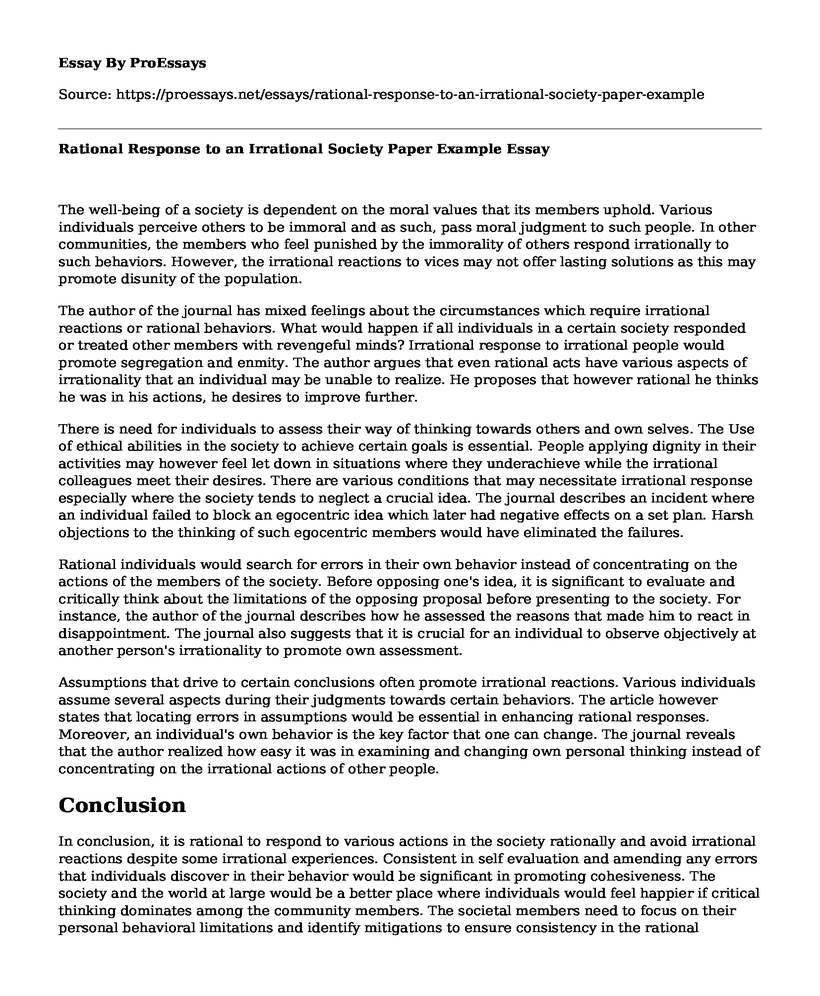The well-being of a society is dependent on the moral values that its members uphold. Various individuals perceive others to be immoral and as such, pass moral judgment to such people. In other communities, the members who feel punished by the immorality of others respond irrationally to such behaviors. However, the irrational reactions to vices may not offer lasting solutions as this may promote disunity of the population.
The author of the journal has mixed feelings about the circumstances which require irrational reactions or rational behaviors. What would happen if all individuals in a certain society responded or treated other members with revengeful minds? Irrational response to irrational people would promote segregation and enmity. The author argues that even rational acts have various aspects of irrationality that an individual may be unable to realize. He proposes that however rational he thinks he was in his actions, he desires to improve further.
There is need for individuals to assess their way of thinking towards others and own selves. The Use of ethical abilities in the society to achieve certain goals is essential. People applying dignity in their activities may however feel let down in situations where they underachieve while the irrational colleagues meet their desires. There are various conditions that may necessitate irrational response especially where the society tends to neglect a crucial idea. The journal describes an incident where an individual failed to block an egocentric idea which later had negative effects on a set plan. Harsh objections to the thinking of such egocentric members would have eliminated the failures.
Rational individuals would search for errors in their own behavior instead of concentrating on the actions of the members of the society. Before opposing one's idea, it is significant to evaluate and critically think about the limitations of the opposing proposal before presenting to the society. For instance, the author of the journal describes how he assessed the reasons that made him to react in disappointment. The journal also suggests that it is crucial for an individual to observe objectively at another person's irrationality to promote own assessment.
Assumptions that drive to certain conclusions often promote irrational reactions. Various individuals assume several aspects during their judgments towards certain behaviors. The article however states that locating errors in assumptions would be essential in enhancing rational responses. Moreover, an individual's own behavior is the key factor that one can change. The journal reveals that the author realized how easy it was in examining and changing own personal thinking instead of concentrating on the irrational actions of other people.
Conclusion
In conclusion, it is rational to respond to various actions in the society rationally and avoid irrational reactions despite some irrational experiences. Consistent in self evaluation and amending any errors that individuals discover in their behavior would be significant in promoting cohesiveness. The society and the world at large would be a better place where individuals would feel happier if critical thinking dominates among the community members. The societal members need to focus on their personal behavioral limitations and identify mitigations to ensure consistency in the rational activities.
Cite this page
Rational Response to an Irrational Society Paper Example. (2022, Sep 05). Retrieved from https://proessays.net/essays/rational-response-to-an-irrational-society-paper-example
If you are the original author of this essay and no longer wish to have it published on the ProEssays website, please click below to request its removal:
- All Men Are Created Equal
- Principles of Professional Ethics for the Intelligence Community to Nursing Code of Ethics
- Essay Example on Urban Sprawl: The Growing Threat to Environment and Society
- Family Reunification: Vital for Social and Economic Progress - Essay Sample
- Depression: Poor, Ethnic Minorities Less Likely to Receive Treatment - Essay Sample
- Paper Example on Educational Technology: Empowering Individuals to Live Better in Society
- Essay Exploring Themes in Jesmyn Ward's 'Sing, Unburied, Sing': Family, Race, and Death







